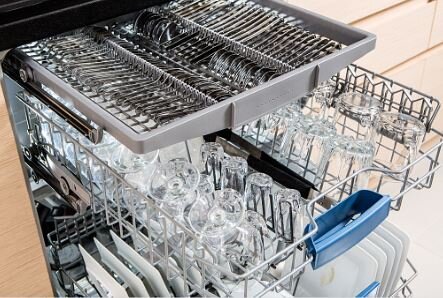It’s easy to take your dishwasher for granted. When everything is in ideal working order, you can load up the day’s dishes, run a cleaning cycle, and spend the next hour working on other chores or simply relaxing after a long day. Most of the time, the biggest challenge you’ll face is taking the time to put the clean dishes away before you have more dirty dishes to wash
But like any appliance that sees regular use, your dishwasher can sometimes encounter problems. An accumulation of food, paper, and other scraps can create clogs and cause a backup. This can be caused by a clogged filter, or it could be a sign of another problem somewhere further down the line. If water is standing at the bottom of your dishwasher, there are a few steps you can take in order to drain it. If you can’t fix the clog on your own, calling a professional will be necessary to get your drains flowing freely.
You could have a clogged filter basket. Your dishwasher has a filter basket fitted in the drain that prevents scraps of food and other items from entering the pipes. They can be tricky to remove, but with patience, you can get it free. Grasp the basket firmly and gently pull. It needs to be cleaned routinely so that your dishes come out sparkling clean. If your home has hard water, you may need to soak the drain basket in a little vinegar to remove the deposits because over time they can clog the holes of a dishwasher’s filter basket.
The drain hose could be clogged. If clearing the filter basket doesn’t fix the dishwasher clog and it’s still not draining, then this is the next step to take. Your dishwasher drains through a hose that can be connected to your kitchen sink drain or garbage disposal. The drain hose can get an interior build-up of sludge, blocking it from draining. For those of you who are handy around the house, if you are cleaning the dishwasher drainpipe, take the time to clean the other drainpipes under your sink and you will be able to eliminate them as a source of your drainage issues.
If you replaced your garbage disposal recently, and your dishwasher became clogged, check to make sure that the knockout plug was removed from the disposal when it was installed. If it has not been removed, it can prevent the dishwasher from draining. Removal of this plug may solve your issue. If your garbage disposal is older, it may be contributing to a drain clog, especially if you haven’t been careful about what you’ve been putting down the disposal.
A clogged drain further down the sewer line may be the reason that the dishwasher isn’t draining properly. If you have more than one clogged drain, however, or if the water is gurgling back up into the sink when your dishwasher drains, you may have more than a small clog that has nothing to do with your dishwasher.
While it’s not what most people would think of when the dishwasher is clogged, a broken sewer pipe could block all of the drains in your home. If the dishwasher, guest toilet, and shower will not drain, it’s time for a professional assessment of your home or business sewer pipes.
Sewer lines can fail because they are old, pipes can separate due to shifting ground, getting sections out of alignment, or tree roots can infiltrate them. Trenchless plumbing techniques like sectional point repair can rehabilitate and replace the older piping and are less invasive than traditional sewer line, replacement methods. The product used to replace your sewer pipes has a life cycle of 50 years, giving you many years of carefree use.
If you have done all the above and are still having dishwasher drain issues, it may be time to call a professional. Although the sewer system of your home quietly works in the background, when it fails, everyone is aware of the problem and it needs to be addressed immediately.
If your pipes are continually clogging and causing backups, contact NDI Plumbing for an assessment of the sewer lines in your home.

